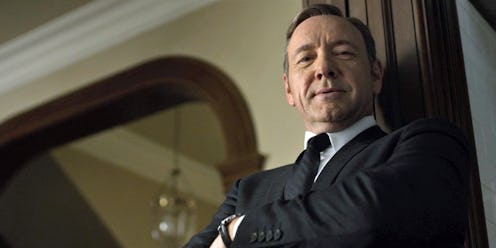News
Frank Underwood's More Popular Than Obama

President Obama is not known as a uniting president by any means, due in part to the factious political landscape today that often feels as though Democrats and Republicans are mortal enemies, rather than groups with different values that share the common goal of the nation's betterment (that's optimism, right there). In an interesting new Reuters-Ipsos poll published Monday that pit Obama against make-believe presidents, the ruthless POTUS of House of Cards, Frank Underwood, beat Obama in favorable ratings by slightly over 10 percent.
Portrayed by the eminent Kevin Spacey, Underwood is a brutal, take-no-prisoners kind of guy who works his way up to the nation's highest office through underhanded means — though some might just call that politics. Obama himself has expressed admiration for the fictional Underwood's knack for "getting a lot of stuff done." At a 57 percent favorable rating, though, it seems Underwood fares better with the American public than Obama does at 46 percent.
That's a pretty big gap, and Underwood is a mere fifth among the five fictional presidents more highly favored than Obama in the poll. But how would the events and achievements of these five fare in real life?
David Palmer, 24 (89 percent favorable rating)
Played by Dennis Haysbert in the thriller/action series, Palmer, like Obama, is the nation's first black president. Though only on the show for five seasons — he was killed off in the fifth — Palmer was its second most prominent protagonist after lead character Jack Bauer. Considering this was a show that revolved around Bauer fighting terrorists, Palmer's political escapades weren't focused on. He did, however, controversially opened the Arctic National Wildlife Refuge in Alaska to oil exploration — something that would cause a huge uproar among environmentalists.
President Obama probably wouldn't have done that, as he actually opposed drilling in the area.
Josiah "Jed" Bartlet, The West Wing (82 percent favorable rating)
The made-believe Bartlet, played by Martin Sheen and was popular while the real life President Bush was in office, implemented a massive Social Security reform during his presidency. But according to Think Progress, if his Social Security plan had actually been in effect during the 2008 financial meltdown, "millions of American seniors would have been left with no safety net to fall back on." So maybe he wouldn't have performed so well in reality, after all.
Otherwise, Bartlet did have a powerful moment when he admonished a socially conservative radio host for her anti-gay beliefs.
Laura Roslin, Battlestar Galactica (78 percent favorable rating)
Mary McDonnell played Roslin of the sci-fi show who was President of the Twelve Colonies of Kobol. The show touched on abortion — albeit in a different kind of political climate — and Roslin, against her pro-choice stance, was forced to ban abortion because the survival of the human race depended on repopulation.
Obviously, humans aren't at risk of going extinct on Planet Earth, so no POTUS would have had to make such choices (also due to a lack of authority; the Leader of the Free World title does not extend such powers to outside U.S. borders). But a hostile GOP would never allow such a thing anyway.
Fitzgerald Grant, Scandal (60 percent favorable rating)
TV critics have widely denounced Grant — played by Tony Goldwyn — as a terrible romantic partner lacking sincerity in almost everything he does. In the show, Grant released a terrorist from prison, personally killed a Supreme Court justice and had an ongoing affair with his campaign manager, Olivia Pope, played by Kerry Washington.
The latter two issues a real-life president could have possibly kept a secret, but chances are, POTUS in real life would have had to fight tooth and nail with the Senate to release a known terrorist from jail time.
Frank Underwood, House Of Cards (57 percent favorable rating)
Personally, I can't help binge-watching the Netflix show, thanks to Spacey's expertise in conveying Underwood's twisted magnetism. His most radical idea was to completely do away with Social Security, instead using that money to provide jobs for anyone who wanted them — as a lame duck president, no less — a feat he somehow managed in the District of Columbia and tries to implement across the nation.
Underwood's economic plan, forced through an ill-disposed Congress, is deranged. In simple terms, it would never, ever happen.
None of these characters were great presidents. Of course, it's much easier to appreciate a fictional president — whom TV writers carefully craft so that while you might disagree with his/her actions, you will identify with his/her personality — than it is to do so a real one, especially in the kind of partisan political climate that exists today.
Image: Getty Images (5), Netflix